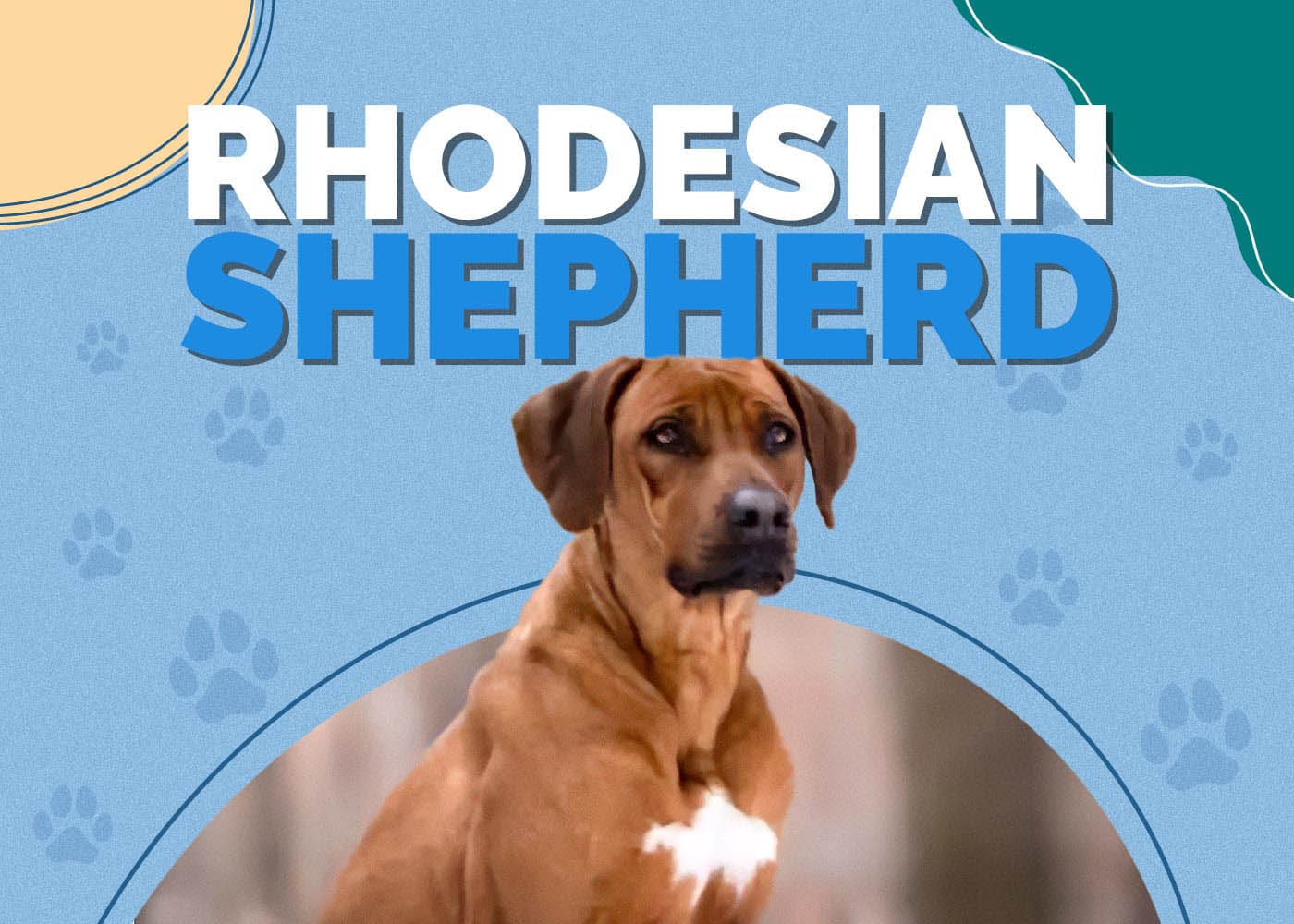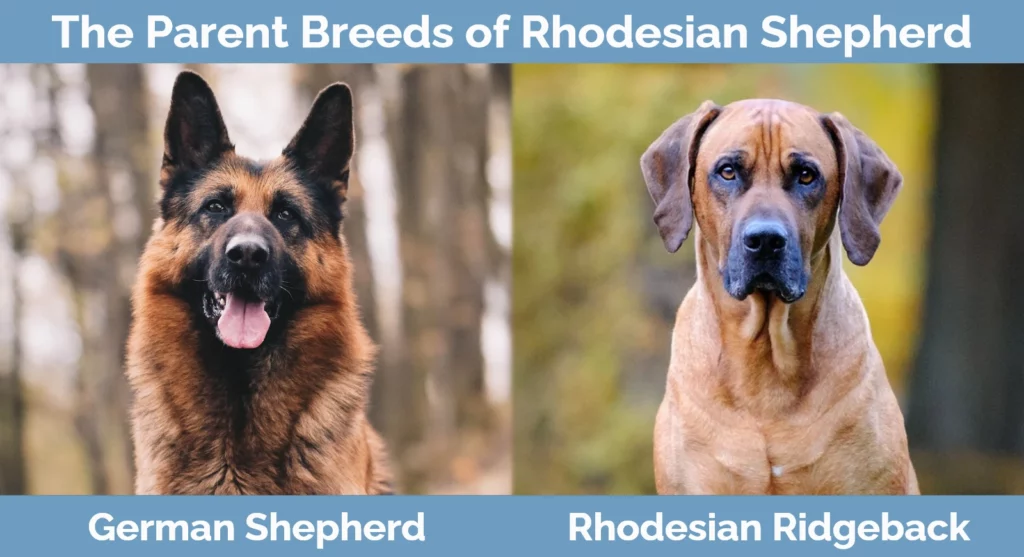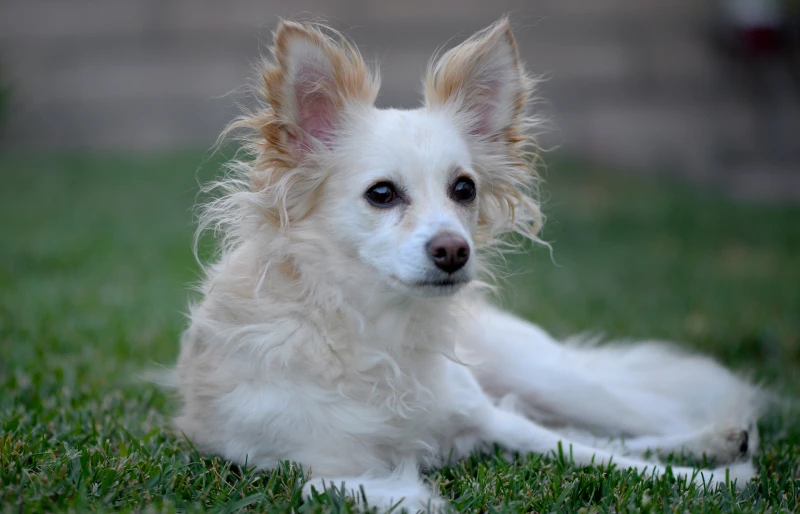Rhodesian Ridgeback German Shepherd Mix (Rhodesian Shepherd): Info, Pictures, Characteristics & Facts

Updated on

Height:
23–27 inches
Weight:
65–95 pounds
Lifespan:
9–12 years
Colors:
Fawn, sable, black and tan
Suitable for:
Active families, experienced dog handlers, canine sports enthusiasts
Temperament:
Intelligent, keen, watchful, determined, alert, loyal, dignified
Rhodesian Shepherds are a rare and unique crossbreed in the designer dog breed world, often sporting the same ridge along their spines that the Rhodesian Ridgeback is famous for. The result of crossing a purebred Rhodesian Ridgeback and a purebred German Shepherd, Rhodesian Shepherds are highly intelligent and athletic canines. They’re excellent companions for active families and individuals, especially those who enjoy hiking and being outdoors. Rhodesian Ridgebacks can be a handful for inexperienced owners, but they’re also quite loving and affectionate. Let’s take a look at this large hybrid to see what it takes to have one.
 Rhodesian Shepherd Puppies
Rhodesian Shepherd Puppies
Although they’re not purebred dogs, their status as a designer dog breed has created a small market for them. This alone can make them more expensive, as well as being crossed with a rare purebred dog.
3 Little-Known Facts About the Rhodesian Shepherd
1. Some Rhodesian Shepherds inherit the Ridgeback.
Although not all Rhodesian Shepherds will, some are lucky enough to inherit the classic Ridgeback strip. Rhodesian Ridgebacks have a strip of fur along their spine that goes in the opposite direction of their coat, which is not only a breed standard but a requirement for purebreds.
2. Rhodesian Shepherds can weigh over 75 pounds.
Rhodesian Shepherds are big dogs, with the average dog weighing around 75–80 pounds. This makes them not suitable for most apartments and city living, especially with their exercise needs. While puppies can be adorable, it’s best to remember just how large Rhodesian Shepherds can become.
3. Rhodesian Shepherds are hard workers.
Just like their purebred counterparts, Rhodesian Shepherds are natural working dogs that need some purpose. This can be a real challenge for inexperienced dog handlers, so this mix is definitely not for everyone. However, as long as their exercise needs are met, Rhodesian Shepherds will repay you with affection and loyalty.

Temperament & Intelligence of the Rhodesian Shepherds 🧠
Rhodesian Shepherds are not purebred dogs, so there isn’t much information on their temperaments. One way to understand what kind of temperament your Rhodesian Shepherd might have is to look at the parent dogs, but that’s not always a possibility. The next best way is to study the temperaments of German Shepherds and Rhodesian Ridgebacks.
German Shepherds are one of the most sought-after working dog breeds, having been around for centuries. Originally developed for herding, German Shepherds are extremely versatile dogs due to their high intelligence levels. It’s easy to mistake Rhodesian Shepherds for beginner dogs, which can’t be further from the truth. These dogs not only need a purpose but a calm, confident leader to follow, or else they’ll gladly take up the role of leader. They also require hours—no exaggeration—of exercise to keep them calm and well-mannered. However, if their needs are met on a daily basis, they’ll be fiercely loyal and affectionate to anyone they deem family.
Rhodesian Ridgebacks are, by contrast, calmer and more laid-back than German Shepherds, though they still have the instincts of a hunting dog. Originally bred for hunting and homestead protection, Rhodesian Ridgebacks can seem quite intimidating. Although they’re not as demanding as German Shepherds, Ridgebacks are quite self-aware and can become strong-willed. Often reserved and even aloof with strangers, these large hunting dogs need to be socialized early to establish proper social etiquette. Except for their early years as puppies and young adults, Rhodesian Ridgebacks tend to be calm and quiet indoors.
Are These Dogs Good for Families? 🏡
Yes, but not for all families. Generally, Rhodesian Shepherds are great for active families, especially families that are outside daily. Families with children who enjoy playing and spending time with their dogs are the ideal situation for Rhodesian Shepherds. However, we don’t recommend this mix to families with no previous dog experience. These dogs need a confident leader, or they’ll start to exhibit behavioral issues that can be hard to spot and correct without experience.
Does This Breed Get Along with Other Pets? 🐶 😽
Rhodesian Shepherds can get along with other dogs, as long as they’re introduced slowly. Most will enjoy having a companion, especially if they’re raised at a young age together. As for cats and small animals, it depends on each individual dog. Some Rhodesian Shepherds have little to no prey drive, whereas others will chase your house cat into hiding on an hourly basis.
 Things to Know When Owning a Ridgeback Shepherd:
Things to Know When Owning a Ridgeback Shepherd:
Food & Diet Requirements 🦴
Working dogs, whether purebred or hybrid, need specialized diets packed with protein and nutrients to support their energy levels throughout the day. We recommend a crunchy dry kibble with at least 25% crude animal-based proteins while avoiding filler ingredients that provide no nutritional value. For a more specialized diet, consult with your veterinarian for a customized diet plan.
When feeding any large dog, especially German Shepherds and Shepherd-mixes, it is extremely important to let them rest for 30 minutes after eating. Running and jumping around after a meal can cause their stomachs to flip, which is extremely fatal and requires emergency surgery to correct. Talk to your vet about the signs and symptoms of this phenomenon, and ways to prevent this from happening.
Exercise 🐕
Exercising your Rhodesian Shepherd is not only a requirement, it should be a great way to bond with your dog. At a bare minimum, a few long walks a day plus a couple of hours of playtime might suffice, but each dog is different. Since Rhodesian Shepherds are athletic dogs, competitive canine sports are an excellent option as a way to exercise and bond. Agility, dock jumping, and tracking are all great activities in which Rhodesian Shepherds will excel, especially with the German Shepherd’s natural competitive spirit.
With any kind of herding, hunting, or working dog, mental stimulation is just as important, but it can be hard to provide this for highly intelligent dogs. Puzzle toys might work at first, but Rhodesian Shepherds can usually figure these out after a few attempts. Tracking is a great physical and mental exercise that can be done anywhere and relies on their senses to find the bait item.
Training 🦮
Training your Rhodesian Shepherd needs to start from day one, with a focus on a consistent training schedule. Because these dogs need a purpose, having a structured schedule is crucial to prevent behavioral issues. Positive reinforcement training with a wide variety of rewards (food, toys, praise) is the best method for Rhodesian Shepherds, which can be sensitive to harsh training methods. However, if you’ve never trained a dog before, we highly recommend hiring a professional dog trainer who specializes in working breeds.
Since early socialization with humans and dogs is crucial, group puppy classes can be a great opportunity. The classes will also teach basic obedience, which your Rhodesian Shepherd will most likely excel at. If puppy classes are not an option, competitive canine sports centers are a good alternative for socialization and exercise.
Grooming ✂️
Grooming your Rhodesian Shepherd will be fairly easy, especially if your puppy inherits more of the Rhodesian shorthaired coat. Expect to brush the coat at least once a week, though it may be more often for thicker, fluffier coats. Bathing your Rhodesian Shepherd is fine once in a while, but overbathing can lead to dry, irritated skin. In addition to caring for the coat, trimming the nails is equally important. Trim the nails on an as-needed basis, or at least every 4–6 weeks.
Health and Conditions ❤️
Since there is no data on Rhodesian Shepherds’ health, there’s no way to know what health issues they may have. However, there are plenty of health records of both German Shepherds and Rhodesian Ridgebacks, which can narrow down the possibilities a bit. Here are the most common health conditions of the German Shepherd and the Rhodesian Ridgeback:
- Canine Hip Dysplasia
- Bloat/GDV (Especially prominent in this breed)
- Hemophilia
- Cancer
- Epilepsy
- Arthritis
- Progressive Retinal Atrophy
- Canine Hip Dysplasia
- Elbow Dysplasia
- Bloat
- Cataracts
- Deafness
- Hypothyroidism
 Male vs Female
Male vs Female
The only main difference between male and female Rhodesian Shepherds is size, with males usually being bigger and heavier than females. Except for the size difference, the choice of female or male Rhodesian Shepherd is purely a personal matter. When choosing a puppy, the decision of male or female should be made by all individuals involved.
 Final Thoughts on the Rhodesian Shepherd
Final Thoughts on the Rhodesian Shepherd
Rhodesian Shepherds are quite unique hybrids that are relatively new to the designer dog world, especially with the rarity of purebred Rhodesian Ridgebacks. These active, athletic dogs are highly intelligent and motivated but require a lot of attention, time, and experience to handle properly. Although they can be a handful, these dogs are extremely loyal to their families. If you’re looking for a working breed and you have the time or space for them, Rhodesian Ridgebacks can be great working dogs and companions.
See Also:
- Rhodesian Ridgeback Weimaraner Mix: Info, Pictures, Characteristics & Facts
- Rhodesian vs Thai Ridgeback: How Do They Compare?
Featured Image Credit: Marry Kolesnik, Shutterstock
 Rhodesian Shepherd Puppies
Rhodesian Shepherd Puppies
 Things to Know When Owning a Ridgeback Shepherd:
Things to Know When Owning a Ridgeback Shepherd: Final Thoughts on the Rhodesian Shepherd
Final Thoughts on the Rhodesian Shepherd








